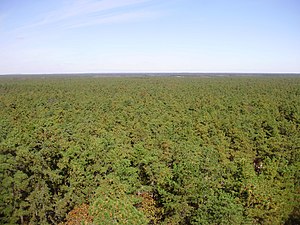Atlantic coastal pine barrens
| Atlantic coastal pine barrens | |
|---|---|

The Pine Barrens of New Jersey
|
|
 |
|
| Ecology | |
| Biome | Temperate coniferous forests |
| Bird species | 212 |
| Mammal species | 45 |
| Geography | |
| Area | 9,000 km2 (3,500 sq mi) |
| Country | United States |
| States | Massachusetts, New Jersey and New York |
| Conservation | |
| Habitat loss | 30.06% |
| Protected | 22.9% |
The Atlantic coastal pine barrens is a temperate coniferous forest ecoregion of the northeastern United States distinguished by its nutrient-poor, often acidic soils and a pine tree distribution naturally controlled by frequent fires.
This ecoregion covers a disjunct area of 8,975 km2 including the New Jersey Pine Barrens on the coastal plain of New Jersey, and smaller areas of southern Long Island in New York State, and on Cape Cod in Massachusetts.
The pine barrens are underlain by sandy, nutrient-poor soils, which typically support stunted forests dominated by pines (Pinus spp.). The distinct flora of this ecoregion is maintained by the poor soils and frequent fires which revive the pines; surrounding areas with better soils are part of the Northeastern coastal forests ecoregion.
This ecoregion has a humid subtropical climate in some sections, and an oceanic climate or a humid continental climate in others.
The composition of the flora of the pine barrens is largely determined by fire frequency. Pine-dominated forests are the characteristic forests of this ecoregion, but where fires occur at intervals of 10 years or less, dwarf pine forests develop. Where fires are infrequent, oak-dominated forest develop. In wetland areas grow cedar swamp forests and hardwood swamp forests.
Pitch pine (Pinus rigida) is the most abundant tree here. Shortleaf pine (Pinus echinata) is also present, but not as abundant. In the southern regions of the New Jersey Pine Barrens, loblolly pine (Pinus taeda) and pond pine (Pinus serotina) are present and fairly commonly encountered. A variety of oaks grow among the pines, including black (Quercus velutina), white (Quercus alba), post (Quercus stellata), chestnut (Quercus prinus), scarlet (Quercus coccinea), and blackjack (Quercus marilandica). These forests tend to be open with widely spaced trees and plenty of sunlight reaching the forest floor.
...
Wikipedia
